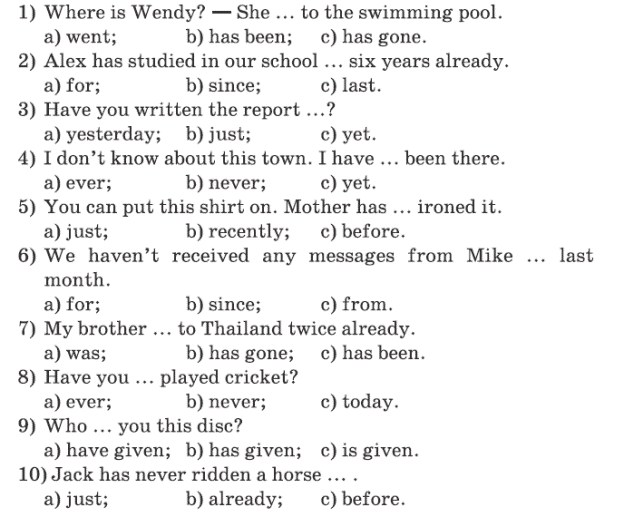Present Perfect
To form the Present Perfect Tense we use has or have with the past participle form of the verb. Most past participles end in -ed (worked, studied, etc.). Irregular verbs have special past participles that must be memorized. (went, spoken, seen, etc.) We use Present Perfect Tense: · to express an action that began in the past and continues in the present (often with since and for). Example: David has worked in Spain since 1996. · with adverbs such as ever, already, never, recently, lately, yet, always, etc. Example: Jane has already recieved her birthday presents. · to express an action that happened at an indefinite time in the past (the exact time when it happened is not important) Example: We have moved into a new house. · to talk about a repeated action in the past with unspecified time of completion (with so far, many times, since, for the last year,for hours, for a week, several times, etc.) Example: He has been in New York many times. · to talk about a very recently completed action Example: We have just finished our lunch. · we often use Present Perfect after a superlatives Example: This is the most delicious food I have ever eaten. · we also use Present Perfect with the expressions "This is the first time...", "It's the first time...", etc. Example: It's the first time I've ever eaten Chinese food · sometimes Present Perfect is used to emphasise on the completion of the act in the time clause (with time words such as when, until, after, before, as soon as) Example: You can go out as soon as you have finished your homework. Exercise 1.Put the verbs in brackets in the correct form: Exercise 2.Translate into English:
Exercise 3.Make up the sentences using the Present Perfect:
Exercise 4.Put the verbs in brackets into the correct form:
TEST 3 (Present Perfect) 1. Choose the correct answer:
2. Make up the sentences using the Present Perfect:
3. Translate into English:
|











